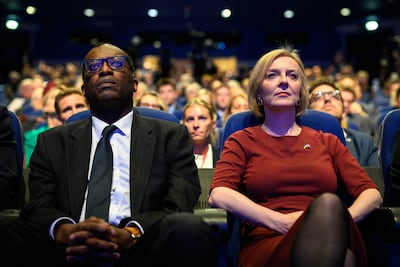“The last thing we need is a general election,” Liz Truss said dismissively to rebuff a question on how to reverse Britain’s sudden economic decline.
That might soon become the last option left to her flailing government. She attempted to deflect the sense of growing doom palpable during Prime Minister’s Questions on Wednesday.
The inescapable fact, as articulated by Labour leader Sir Keir Starmer, was that Ms Truss and her Chancellor Kwasi Kwarteng had unleashed a tornado in their tax-cutting “kamikaze budget” whose fall-out is still whirling uncontrollably.
That uncertainty had clearly gripped the Tory benches whose MPs looked on grimly as their new leader attempted to deflect the gathering storm.
Time, it felt for Ms Truss and her fledgling administration, was running out and the options are narrowing.
She adamantly ruled out any government funding cuts with an “absolutely” to Sir Keir’s demand to bring control to spending. But she may well be forced to reverse her tax-cuts to avoid catastrophe, reneging on the promise that cemented her summer leadership election campaign following Boris Johnson’s resignation.
Tory MPs may well give the government until October 31 for the Chancellor Kwasi Kwarteng’s fiscal announcement on how he intends to balance the books to fund the cuts. Some estimates put the ledger £60 billion in the red on his unfunded tax policy.
If he fails to show strong fiscal management then one scenario could be a vote of no confidence in the government, and despite its current 69 seat majority, MPs might see a general election as the only solution to avoid national financial collapse.
Those dark thoughts appeared to be contemplated on the Tory benches as their new leader fought grimly against the facts arrayed before her.

Within a year, up to two million homeowners will face mortgage payments that will have increased by an average of £500 a month, Sir Keir stated.
“Will the public ever forgive the Conservative Party if they go ahead with this kamikaze budget,” he asked. “They won’t forgive and they won’t forget and nor should they. Reverse this kamikaze budget that has caused so much pain.”
The economy was “in turmoil” and people were “genuinely worried”. Few on the Tory benches bothered to raise a voice in contradiction.
Instead, the prime minister variously accused Labour of accepting the budget by not voting against reversing the National Insurance rise or agreeing to the energy price cap.




































It was a weak argument and everyone in the chamber knew it. Ms Truss had voted for the National Insurance rise in Boris Johnson’s government and the energy cap had originally been a Labour proposal, Sir Keir not-so-gently reminded her.
He then added: “During the leadership contest the PM said ‘I’m very clear. I’m not planning public spending reductions’. Are you going to stick to that?”
“Absolutely. Absolutely,” Ms Truss replied with a firm voice, before she was met with a wall of jeers and laughter form the opposition benches. She knows that her government will have to find the money from somewhere.
A veteran Labour MP finished the 45 minutes of questions with one that must have been growing in many minds. After a very short honeymoon period – Ms Truss took power five weeks ago – the “country had been left wanting a divorce”, he said, suggesting she acceded to public demands for an election.
Ms Truss responded that a general election was the last thing the country needed but the pain did not end for the Tories as she left the chamber.
Droves of Tories followed her, leaving behind a brave rear-guard of two score MPs, while the entire Labour benches remained seated.
An Urgent Question had been granted to the shadow chancellor Rachel Reeves asking her opponent to make a statement on the current economic crisis.
“Where is he?” a Labour voice heckled as Mr Kwarteng’s deputy Chris Philp stood to explain the Treasury’s position.
The chancellor, he replied without a trace of irony, was “in Washington having meetings with the IMF”. He quickly realised his error. In Britain the International Monetary Fund is political anathema after its 1976 bail-out was the final humiliation after years of financial mismanagement.

Ms Reeves then accused the Treasury of being economic “pyromaniacs” whose policies had started an inferno “and that fire has now spread”.
Mr Philp did not steady the nerves of the 40-odd Tory stalwarts behind him with his staccato answers.
It was left to Mel Stride, the moderate Conservative who chairs the treasury committee, to introduce some reality.
“Given the huge challenges, many, myself included, believe it is quite possible [the Chancellor] will simply have to come forward with a further rowing back of on the tax announcements he made,” he said
But Mr Philp insisted “there are not any plans to reverse any of the tax measures in the growth plan”.
Signalling perhaps that cuts or reversals might indeed be made in Mr Kwarteng’s Hallowe’en budget update, the Prime Minister’s spokesman later told the media that “difficult decisions lie ahead”.
Ms Truss and her colleagues must realise now that something has to give if she is to remain in power.


